- Home
- James Clavell
Gai-Jin Page 3
Gai-Jin Read online
Page 3
As Angelique came alongside, Struan’s eyes crinkled in a smile. He had been openly in love with her from the first moment he had seen her four months ago in Hong Kong, the first day she arrived—to take the island by storm. Fair hair, perfect skin, deep blue eyes with a pleasing upturned nose in an oval face that was in no way pretty but possessed a strange, breathtaking attractiveness, very Parisian, her innocence and youth overlaid with a perceptible, constant, though unconscious sensuality that begged to be assuaged. And this in a world of men without eligible wives, without much hope of finding one in Asia, certainly never like her. Many of the men rich, a few of them merchant princes. “Pay no attention to the natives, Angelique,” he whispered, “they’re just awed by you.”
She grinned. Like an Empress, she bowed her head. “Merci, Monsieur, vous êtes très aimable.”
Struan was very content and now, very sure. Fate, joss, God threw us together, he thought, elated, planning when he would ask her father’s permission to marry. Why not Christmas?
Christmas will be perfect. We’ll marry in the spring and live in the Great House on the Peak in Hong Kong. I know Mother and Father already adore her; my God, I hope he really is better. We’ll give a huge Christmas party.
Once on the road they made good progress, taking care not to impede traffic. But, whether they liked it or not, their unexpected presence—the vast majority of incredulous Japanese had never seen people of this size and shape and coloring, particularly the girl—along with their top hats and frock coats, stovepipe trousers and riding boots, and her boots and riding habit and top hat with its saucy feather, and riding sidesaddle, inevitably created traffic jams.
Both Canterbury and Struan watched those on the road carefully as the oncomers swirled past, around them, though always giving way to their progress. Neither man sensed or expected any danger. Angelique kept close, pretending to ignore the guffaws and gaping and the occasional hand that tried to touch her, shocked at the way many men carelessly tucked up their kimonos, exposing their skimpy loincloths and ample nakedness: “Dearest Colette, you’ll never believe me,” she thought, continuing the letter she would complete tonight to her best friend in Paris, “but the vast majority of the legions of porters on the public highway wear only these tiny loincloths that hide almost nothing in front and become a thin string between the buttocks behind! I swear it’s true, and I can report that many of the natives are quite hairy though most of their parts are small. I wonder if Malcolm …”
She felt herself flush. “The capital, Phillip,” she said, making conversation, “it is truly forbidden?”
“Not according to the Treaty.” Tyrer was vastly pleased. Only a few minutes and she had dropped the Monsieur. “The Treaty arranged for all Legations to be in Yedo, the capital. I was told we evacuated Yedo last year after the attack on ours. Safer to be at Yokohama under the guns of the fleet.”
“Attack? What attack?”
“Oh, some madmen called ronin—they’re some kind of outlaw, assassins—a dozen of them attacked our Legation in the middle of the night. The British Legation! Can you imagine the gall! The devils killed a sergeant and a sentry …”
He stopped as Canterbury swung off the roadway and reined in and pointed with his riding crop. “Look there!”
They halted beside him. Now they could see the tall, thin banners held aloft by the ranks of samurai tramping around a bend towards them, a few hundred yards ahead. All travellers were scattering, bundles and palanquins hastily thrown to the ground, well out of the way, riders dismounting hurriedly, then everyone knelt on the sides of the roadway with heads bowed to the packed earth, men women children, and stayed motionless. Only the few samurai remained standing. As the cortege passed, they bowed deferentially.
“Who is it, Phillip?” Angelique asked excitedly. “Can you read their signs?”
“Sorry, no, not yet, Mademoiselle. They say it takes years to read and write their script.” Tyrer’s happiness had evaporated at the thought of so much work ahead.
“It is the Shōgun perhaps?”
Canterbury laughed. “No chance of that. If it was him they’d have this whole area cordoned off. They say he has a hundred thousand samurai at his slightest beck. But it’ll be someone important, a king.”
“What shall we do when they pass?” she asked.
“We’ll give them the royal salute,” Struan said. “We’ll doff our hats and give him three cheers. What will you do?”
“Me, chéri?” She smiled, liking him very much, remembering what her father had said before she had left Hong Kong for Yokohama: “Encourage this Malcolm Struan, but with care, my little cabbage. I have already, discreetly. He would make a marvelous match for you, that’s why I advocate this sightseeing trip to Yokohama, unchaperoned, providing he escorts you in one of his ships. In three days you’re eighteen, time you were married. I know he’s barely twenty and young for you, but he’s smart, the eldest son, he’ll inherit the Noble House in a year or so—it’s rumored his father, Culum, the tai-pan, is much sicker than the company publicly allows.”
“But he’s British,” she had said thoughtfully. “You hate them, Papa, and say we should hate them. You do, don’t you?”
“Yes, little cabbage, but not publicly. Britain’s the richest country in the world, the most powerful, in Asia they’re king, and Struan’s the Noble House—Richaud Frères are small. We would benefit immensely if we had their French business. Suggest it to him.”
“Oh, I couldn’t, Papa, that would be … I couldn’t, Papa.”
“You’re a woman now, not a child, my pet. Beguile him, then he will suggest it himself. Our future depends on you. Soon Malcolm Struan will be the tai-pan. And you—you could share it all…. ”
Of course I would adore such a husband, she thought. How wise Papa is! How wonderful to be French, therefore superior. It’s easy to like, perhaps even to love this Malcolm with his strange eyes and young old looks. Oh, I do so hope he asks me.
She sighed and turned her attention to the present. “I will bow my head as we do in the Bois to His Majesty, the emperor Louis Napoléon. What is it, Phillip?”
“Perhaps we’d better turn back,” Tyrer said uneasily. “Everyone says they’re touchy about us near their princes.”
“Nonsense,” Canterbury said. “There’s no danger, never has been a mob attack—this isn’t like India, or Africa or China. As I said, Japanners are mighty law-abiding. We’re well within the Treaty limit and we’ll do as we always do, just let them pass, raise your titfer politely as you would to any potentate, then we’ll go on. You’re armed, Mr. Struan?”
“Of course.”
“I’m not,” Angelique said a little petulantly, watching the banners that now were barely a hundred yards away. “I think women should carry pistols if men do.”
They were all shocked. “Perish that thought. Tyrer?”
Feeling awkward Tyrer showed Canterbury the small derringer. “It was a going-away present from my father. But I’ve never fired it.”
“You won’t need to, it’s only the lone samurai you have to watch, the ones or twos, the anti-foreign fanatics. Or the ronins,” then added without thinking, “Not to worry, we haven’t had any trouble for a year or more.”
“Trouble? What trouble?” she asked.
“Nothing,” he said, not wanting to concern her and trying to cover the slip. “A few attacks by a few fanatics or two, nothing important.”
She frowned. “But Monsieur Tyrer said there was a mass attack on your British Legation and some soldiers were killed. That’s not important?”
“That was important.” Canterbury smiled thinly at Tyrer who read the message clearly: you’re a bloody idiot to tell a lady anything of any importance! “But they were an isolated gang of cutthroats. The Shōgunate bureaucracy have sworn they’ll catch them and punish them.”
His voice sounded convincing, but he was wondering how much of the truth Struan and Tyrer knew: five men murdered on the streets of Yokoh
ama in their first year. The next year two Russians, an officer and a sailor from a Russian man-of-war, hacked to death, again in Yokohama. A few months later two Dutch merchants. Then the young interpreter at the British Legation in Kanagawa stabbed from behind and left to bleed to death. Heusken, the Secretary of the American Mission, butchered into a dozen pieces while riding home after a dinner party at the Prussian Legation. And last year a British soldier and sergeant cut down outside the Consul General’s bedroom!
Every murder premeditated and unprovoked, he thought, incensed, and committed by a two-sworder. Never once was any offense given—and worst of all, never once has any bastard been caught and punished by the Shōgun’s all-powerful Bakufu, however much our Legation Heads screamed, and however much the Jappers promised. Our leaders are a bloody bunch of stupid bastards! They should have ordered up the fleet at once and blown Yedo to hell, then all the terror would stop, we could sleep safe in our beds without guards, and walk our streets, any streets, without fear when any samurai’s nearby. Diplomats are anus eaters and this young popinjay’s a perfect specimen.
Sourly he watched the banners, trying to decipher the characters. Behind the cortege, once it had completely passed, travellers picked themselves up and went on again. Those going the same way as the column followed at a judicious distance.
It felt curious to the four of them to be mounted and so high above the ragged lines of kneeling figures on both shoulders of the roadway, heads in the dust, rumps in the air. The three men tried not to notice the nakedness, embarrassed that she was there, equally embarrassed.
The ranks of samurai banner men approached relentlessly. There were two columns, each of about a hundred men, then more flags and massed ranks surrounding a black lacquered palanquin carried by eight sweating porters. More banners and samurai followed, then more leading pack ponies and last a motley crowd of ladened baggage porters. All samurai wore grey kimonos with the same insignia, three interlocking peonies, that was also on the banners, and straw hats tied under their chins. Two swords in their belts, one short, one long. Some had bows and arrows slung, a few carried muzzle-loading muskets. A few were more elaborately dressed than others.
The columns bore down.
With growing shock Struan and the others saw what was on all the faces, all eyes fixed on them: fury. He was the first to break the spell. “I think we’d better move farther back…. ”
But before he or any one of them could start, a young, broad-shouldered samurai broke ranks and charged up to them, closely followed by another man, planting himself between them and the approaching palanquin. Choking with rage, the first man threw down his banner and shouted, cursing them away, the suddenness of his blazing anger paralyzing them. The columns faltered, then picked up the cadence and continued passing. The kneeling people did not move. But now, over all was a great, sick silence, broken only by the sound of marching feet.
Again the samurai cursed them. Canterbury was nearest to him. Obediently, nauseated with fear, he spurred his pony. But the turn was inadvertently towards the palanquin, not in the other direction. At once the samurai jerked out his killing sword, shouted, “sonno-joi!” and hacked with all his might. In the same instant the other man went for Struan.
The blow took off Canterbury’s left arm just above his biceps and sliced into his side. The trader gaped at the stump with disbelief as blood sprayed onto the girl. The sword whirled in another brutal arc. Impotently Struan was groping for his revolver, the other samurai charging him, blade raised. More by luck than judgment he twisted out of the path of a blow that wounded him slightly on his left leg and sliced into his pony’s shoulder. The pony screamed and reared in sudden panic, knocking the man aside. Struan aimed and pulled the trigger of the small Colt, but the pony reared again and the bullet went into the air harmlessly. Frantically he tried to steady the animal and aimed again, not seeing that now the first man was attacking from his blind side.
“Watchouttt!” Tyrer screeched, coming back to life. Everything had happened so fast it was almost as though he were imagining the horror—Canterbury on the ground in agony, his pony fleeing, the girl stupefied in her saddle, Struan pointing the gun a second time and the killing sword arching at his unprotected back. He saw Struan react to his warning, the frantic pony skittering at his touch, and the blow that would have killed him was deflected somehow by the bridle or pommel and sliced into his side. Struan lurched in his saddle and let out a howl of pain.
This galvanized Tyrer.
He jammed in his spurs and charged Struan’s attacker. The man leapt aside untouched, noticed the girl and ran for her, sword on high. Tyrer spun his terrified pony, saw Angelique staring at the approaching samurai in frozen horror. “Get out of here, get help!” he screamed, then again slammed at the man who once more twisted to safety, recovered perfectly, and stood with his sword in attack position.
Time slowed. Phillip Tyrer knew he was dead. But that did not seem to matter now, for in the moment’s respite he saw Angelique whirl her pony and flee safely. There was no room for Tyrer to escape, or time.
For a split second the youthful samurai hesitated, exulting in the killing moment, then leapt. Helplessly, Tyrer tried to back away. When the explosion happened, the bullet thrust the man sprawling and the sword failed, cutting Tyrer in the arm but not badly.
For a moment Tyrer did not believe that he was still alive, then he saw Struan reeling in his saddle, blood seeping from the wound in his side, the gun levelled at the other samurai, his frenzied pony twisting and cavorting.
Again Struan pulled the trigger. The gun was near the pony’s ear. The explosion blew away her control and she took the bit and charged off, Struan barely able to hold on. At once the samurai rushed after him and this moment gave Tyrer the chance to dig in his spurs, spin away from the road and race in pursuit, northwards.
“Sonno-joiiii!” the samurai shouted after them, enraged that they had escaped.
John Canterbury was writhing and moaning in the dirt near some petrified travellers, all of them still kneeling, heads down and frozen. Angrily the youth kicked Canterbury’s top hat aside and decapitated him with a single blow. Then, with great care, he cleansed his blade on the frock coat, and replaced it in its scabbard.
And all the while the cortege continued to pass as though nothing was happening, that nothing had happened, eyes seeing everything but nothing. Nor did any of the foot travellers move their heads from the earth.
The other younger samurai was sitting cross-legged on the ground, nursing his shoulder, using his bunched kimono to stop the flow of blood, his sword, still stained, in his lap. His compatriot went over to him and helped him up, cleansed the sword on the kimono of the nearest traveller, an old woman, who shivered in terror but kept her head pressed to the earth.
Both men were young and strongly built. They smiled at each other, then, together, examined the wound. The bullet had gone right through the muscle of his upper arm. No bone touched. Shorin, the older, said, “The wound’s clean, Ori.”
“We should have killed them all.”
“Karma.”
At this moment the massed samurai and the eight terrified porters carrying the palanquin began passing, all pretending the two men and the corpse did not exist. With great deference, the two youths bowed.
The tiny side window of the palanquin slid open, then closed again.
CHAPTER TWO
“Here, Mr. Struan, drink this,” the doctor said kindly, towering over the camp bed. They were in the surgery of the British Legation at Kanagawa and he had managed to stanch most of the blood flow. Tyrer sat on a chair near the window. The two of them had arrived half an hour ago. “It will make you feel better.”
“What is it?”
“Magic—mostly laudanum, that’s a tincture of opium and morphine of my own devising. It will stop the pain. I have to patch you up a little but not to worry, I will use ether to put you quite to sleep.”
Struan felt a sick fear rush through
him. Ether for surgery was a recent innovation, much heralded, but still experimental. “I’ve—I’ve never had one or an—an operation and, and I don’t … think …”
“Don’t worry yourself. Anesthetics are really quite safe in the right hands.” Dr. George Babcott was twenty-eight, well over six feet five and equally proportioned. “I’ve used ether and chloroform many times over the last five or six years, with excellent results. Believe me, you won’t feel anything, and it’s a godsend to the patient.”
“That’s right, Mr. Struan,” Tyrer said, trying to be helpful, knowing he was not. His arm already had been swabbed with iodine, sewn up and bandaged and in a sling and he was thanking his luck that his wound was relatively superficial. “I met a fellow at university who told me he had had his appendix out with chloroform, and it didn’t hurt a bit.” He wanted to sound reassuring, but the idea of any operation—and the gangrene that all too often followed—frightened him too.
“Don’t forget, Mr. Struan,” Babcott was saying, masking his concern, “it’s almost fifteen years since Dr. Simpson first used chloroform in surgery and we’ve learned a lot since then. I studied under him at the Royal Infirmary for a year before I went out to the Crimea.” His face saddened. “Learned a lot there too. Well, that war’s over so not to worry, lovely laudanum will give you some erotic dreams too, if you’re lucky.”
“And if I’m not?”
“You’re lucky. You’re both very lucky.”
Struan forced a smile through his pain. “We’re lucky we found you here and so quickly, that’s certain.” Instinctively trusting Babcott he drank the colorless liquid, and lay back again, almost fainting from the pain.
“We’ll let Mr. Struan rest a moment,” Babcott said. “You’d better come with me, Mr. Tyrer, we’ve things to do.”
“Of course, Doctor. Struan, can I get you anything, do anything?”
“No … no, thanks. No … no need for you to wait.”

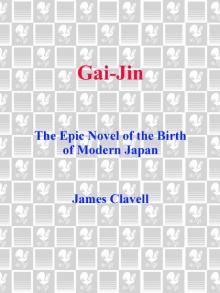 Gai-Jin
Gai-Jin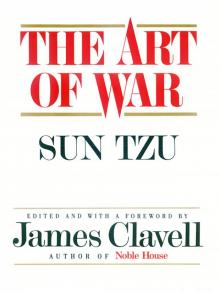 The Art of War
The Art of War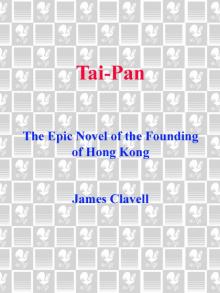 Tai-Pan
Tai-Pan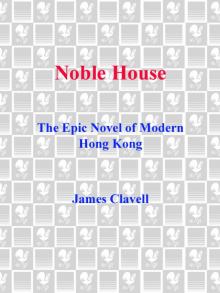 Noble House
Noble House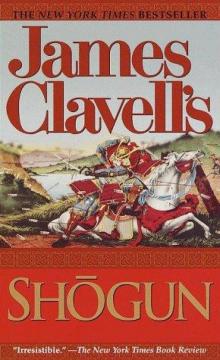 Shōgun
Shōgun Whirlwind
Whirlwind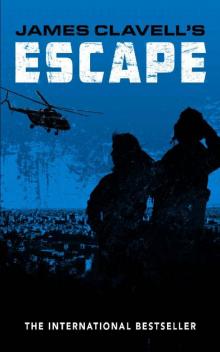 Escape
Escape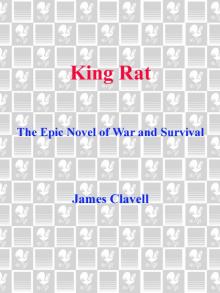 King Rat
King Rat The Children's Story
The Children's Story